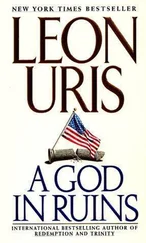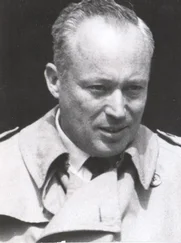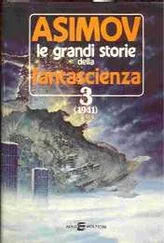Armageddon - Leon Uris
Здесь есть возможность читать онлайн «Armageddon - Leon Uris» весь текст электронной книги совершенно бесплатно (целиком полную версию без сокращений). В некоторых случаях можно слушать аудио, скачать через торрент в формате fb2 и присутствует краткое содержание. Жанр: Старинная литература, на английском языке. Описание произведения, (предисловие) а так же отзывы посетителей доступны на портале библиотеки ЛибКат.
- Название:Leon Uris
- Автор:
- Жанр:
- Год:неизвестен
- ISBN:нет данных
- Рейтинг книги:4 / 5. Голосов: 1
-
Избранное:Добавить в избранное
- Отзывы:
-
Ваша оценка:
- 80
- 1
- 2
- 3
- 4
- 5
Leon Uris: краткое содержание, описание и аннотация
Предлагаем к чтению аннотацию, описание, краткое содержание или предисловие (зависит от того, что написал сам автор книги «Leon Uris»). Если вы не нашли необходимую информацию о книге — напишите в комментариях, мы постараемся отыскать её.
Leon Uris — читать онлайн бесплатно полную книгу (весь текст) целиком
Ниже представлен текст книги, разбитый по страницам. Система сохранения места последней прочитанной страницы, позволяет с удобством читать онлайн бесплатно книгу «Leon Uris», без необходимости каждый раз заново искать на чём Вы остановились. Поставьте закладку, и сможете в любой момент перейти на страницу, на которой закончили чтение.
Интервал:
Закладка:
Then followed the epitome of treachery. The Russians halted their offensive on the Vistula, opposite Warsaw, and did nothing to help the Home Army, which they had urged to rebel. The Germans returned to Warsaw with a pair of SS Panzer Divisions and commenced to butcher the city, the Home Army, and the citizenry as the Russians watched.
London and Washington demanded that Moscow help the Poles. At first Stalin stalled by claiming the Poles had exaggerated their strength and doubted if they controlled Warsaw.
The next stall was to claim the Russian armies were exhausted from their offense and needed to regroup and resupply.
Churchill continued to press the issue. Stalin at last showed his bloody hand. In the end Stalin let it be known he had no intention of helping the embattled Poles on the grounds that the Home Army were “military adventurers.” Stalin obviously wanted the Home Army destroyed because it was attached to the London Poles and might stand in the way of his postwar plans for Poland.
In final desperation Churchill asked for permission to airdrop supplies into Warsaw. Because the distances were great it would necessitate Allied planes landing on Russian airfields after they made their drops.
The Russians refused to allow either American or British aircraft to land on their soil.
And so, Warsaw was destroyed and nearly 200,000 of her people killed.
Hansen had continually sided with the British in their demands to be tough with Stalin and to plan Allied campaigns with a political objective also in mind. At the time of the finale in Warsaw, Roosevelt was a very sick man and the State Department, held in low esteem by Hansen, floundered aimlessly.
Earlier, the British wanted the Southern France landing canceled and instead have a landing made in the Balkans. Hansen backed this idea. It took no fool to realize that France, Holland, Denmark, Belgium, and Luxembourg were going to remain in the West. However, the entire Balkans were in doubt.
Hansen contended that if the Allies had landed in the Balkans and placed an army between Russia and Germany we would be in a position to stop future seizures like Poland. As it stood, the West might default Roumania, Hungary, Yugoslavia, Bulgaria, and perhaps even Czechoslovakia. Moreover, eastern Germany and Austria were in danger.
Russian agents had stirred up revolutions in Greece and Italy, but fortunately, Hansen thought, the British commanded that area of the war and weren’t going to let them get by with it.
The final card of Poland was played. After full refusal to even deal with the London Poles, the Russians installed their own “Liberation Committee” out of Moscow to rule the country.
Having thrown Sean into a quandary with stories he had never known before, Hansen pressed his case home recalling an experience with which Sean was intimate.
When the Allies landed in France, in many towns the French Underground staged an uprising to coincide with the Allied attack. As soon as the town was liberated the Frenchmen were too busy celebrating in accepted French fashions and too relieved with the war ending for them to keep a Gallic eye on their city hall.
In fact, some French troops advanced into towns with women in their tanks and fought the last battle with one hand around a bottle or a woman. And while the Allies and the Underground were getting buried in wine and flowers and bosoms the Communists inside the French Underground quietly seized the mayoralities and police machinery of dozens of French cities. It was Hansen who issued the order to disarm the Communists, however French they claimed to be, and eject them from office.
Hansen poo-pooed the asinine “brotherhood” proclamations that followed the “big three” conferences, particularly from Yalta. The Russians subscribed to glowing statements about democracy which they did not understand and free elections which they had never held. At the same moment they paid this lip service to freedom, their hand-picked henchmen closed the book on Poland as a clear and bright signal of things to come.
Hansen decried the fact that the American General Staff had little mentality for the political situation. While the Russians and British knew enough to plan their battles in line with political advantages, the Americans walked a path of purity and innocence. This stemmed from the fact that America never was threatened by strong neighbors on her borders or even needed to keep a balance of power in her hemisphere.
Consistent with American shortsightedness, the British had to plead for permission to move across northern Germany to block it off and keep the Russians from “liberating” Denmark.
In the end American forces concentrated on an envelopment of the German Army in the Ruhr instead of choosing a rapid advance to Berlin, and Patton was called back out of Czechoslovakia. When Churchill made the last desperate plea for the Americans to dash for Berlin he was answered that Berlin had ceased to have strategic value!
When American forces pulled in back of the Elbe River, their Russian allies of the day before had begun the erection of barbed-wire barriers.
Both Russia and America had been isolationist by nature but the war changed that. Russia had become powerful. The long-smoldering giant began his move to the West. America alone could block him now.
In order to gain a right to be in Berlin, America surrendered two German provinces in another of Stalin’s typical, shrewd moves.
Hansen felt that it took no genius to figure out what would happen in Berlin when the giants met head-on. Yet, an America tired of war, unready to believe their ally of yesterday was the enemy of today, unready to accept their new status of world power would call Hansen an alarmist, a man who cried “wolf.”
And until their countrymen understood what was happening a few Hansens and a few O’Sullivans would have to step into the breach ... and halt a tide in an arena named Berlin.
Chapter Thirty-six
THE MOMENT OF DECISION is the loneliest in human life. It must be come upon in stillness and darkness and brooding thoughts and doubts torn out from the deep reaches of the soul.
Sean O’Sullivan was a political scientist. He knew that if Hansen had spoken the truth on the Polish affair then his fears about Berlin were not only reasonable but valid. Now he labored over stacks of supporting documents, weeding truth from fiction.
We have ordered that Berlin’s main radio transmitter, namely the Funkturm, be spared from bombing. Allied liaison with the Russians is so poor that we often times have to find out where the front lines are in the East from the transmission of German newscasts.
Legendary Russian secrecy and suspicion.... Only Churchill seemed to understand it all. In the very beginning he understood Hitler, but his warnings fell on the ears of the appeasers. And, in the end, he understood Stalin. America was suddenly without leadership. Churchill wanted us to make a physical presence in the Balkans and he wanted us to hold fast in Czechoslovakia. Churchill understood the meaning of having our forces reach Berlin first. We, in a sense, had committed the same blunder Hitler committed when he failed to recognize the importance of Moscow in the beginning of the war and turned his armies on the oil fields in southern Russia. One could now speculate seriously if Russia could have recovered from the capture of Moscow.
In our case we turned to the southern German provinces and to hacking up an already beaten German Army in the Ruhr with the fateful pronouncement that “Berlin ceases to have strategic value.”
Yes, human beings make human errors. However, other human sweat and human blood must pay for those errors. As yet, no one would admit an error had been committed; and few, unlike Hansen, understood the dimensions of the error or the gravity of the situation.
Читать дальшеИнтервал:
Закладка:
Похожие книги на «Leon Uris»
Представляем Вашему вниманию похожие книги на «Leon Uris» списком для выбора. Мы отобрали схожую по названию и смыслу литературу в надежде предоставить читателям больше вариантов отыскать новые, интересные, ещё непрочитанные произведения.
Обсуждение, отзывы о книге «Leon Uris» и просто собственные мнения читателей. Оставьте ваши комментарии, напишите, что Вы думаете о произведении, его смысле или главных героях. Укажите что конкретно понравилось, а что нет, и почему Вы так считаете.











